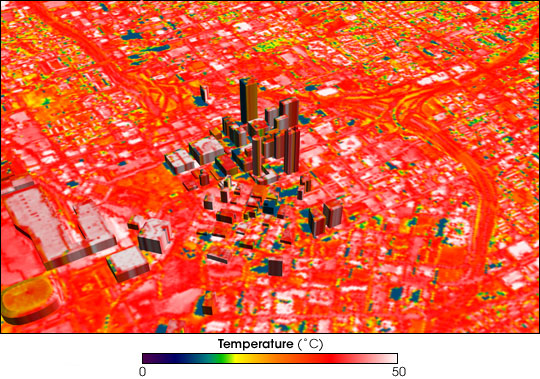The Mayor of London’s attitude towards climate change concerns Green Assembly Baroness Jenny Jones, who is calling for radical changes to prepare for extreme weather such as floods, droughts and heatwaves.

The urban heat island effect as observed in the city of Atalanta, Georgia, USA.
The five yearly Intergovernmental Panel on Climate Change’s (IPCC) ‘Impacts, Adaptation and Vulnerability’ report is released today and warns that we face extreme weather with more floods and heat related deaths. London Assembly member Jenny Jones has previously criticised the Mayor of London for his climate sceptic views. He previously suggested that solar activity, not human activity, is the cause of climate change and that we could be entering a mini ice age.
Jenny Jones said:
“All Londoners will pay for the Mayor’s failure to take the giant strides that are needed to prepare London for extreme weather such as floods, droughts and heatwaves.”
“If Boris Johnson is serious about maintaining a strong economy he would be pulling all the stops to avoid runaway climate change. Our health, our homes, our food and security are all threatened.”
“Instead the Mayor is actively contributing to global warming by backing the expansion of aviation, the most carbon polluting form of transport.”
Jenny’s comments on climate programmes:
1) Trees to cut urban heat island effect – to help London adapt to temperature increases the Mayor has a strategic aim of increasing tree canopy cover by 5% by 2025, the equivalent of 2 million extra trees. It is not clear how this will be achieved with no interim targets, particularly in central London’s built up locations where heat island effect is most pronounced. The Mayor rejected Jenny’s call to consider the ‘Million Trees New York City’ model which delivers 100,000 trees each year, compared to his 10,000 over four years. Tree experts have warned the Mayor that without additional support London could lose net tree canopy cover by 2025.
2) Sea level rise and new Thames Barrier – After the Thames Barrier was closed an unprecedented 50 times during this winter season, its annual safety limit, Boris Johnson on the recommendation of Jenny Jones agreed that the Environment Agency should carry out a full review. Prior to this, the Mayor rejected Jenny’s call for taking a greater leadership role in protecting London from the growing risk of tidal flooding.
3) River restoration and surface water flooding – currently surface water flooding is highlighted as the main flood risk to London. After the Mayor rejected Jenny’s call to expand his 15km target of River Restoration, which increases flood storage capacity and cuts local flood risk to properties, to the 100s of kilometres of London Thames tributaries that could be restored, the Mayor has since agreed to see if more could be funded through existing budgets.
4) Home insulation – To meet the Mayor’s carbon reduction targets, 1.2 million London homes need to be retrofitted by 2015, with an interim 200,000 target by 2012. However of the 50,000 households that were visited by specialist assessors, 3% went on to install energy efficiency measures such as loft and cavity wall insulation. Now this depends on the Government’s Green Deal which has fallen short of its targets and the Energy Company Obligation scheme which since it was changed, will result in hundreds of thousands of hard to treat properties not being insulated.
5) Aviation expansion – Jenny criticised the Mayor for wasting £3m investigating new hub airport capacity and for backing a new Thames Estuary airport that the Davies Commission estimates will cost £112 billion. Jenny has argued that this will just add even more carbon emission and drive climate change.